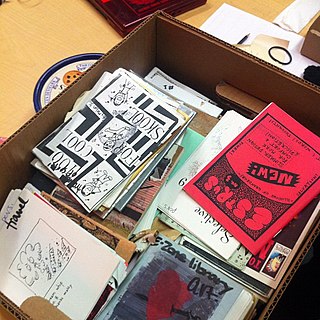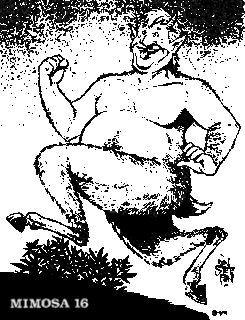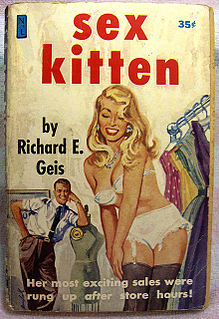Related Research Articles
A fanzine is a non-professional and non-official publication produced by enthusiasts of a particular cultural phenomenon for the pleasure of others who share their interest. The term was coined in an October 1940 science fiction fanzine by Russ Chauvenet and first popularized within science fiction fandom, and from there it was adopted by other communities.

Science fiction is a genre of speculative fiction which typically deals with imaginative and futuristic concepts such as advanced science and technology, space exploration, time travel, parallel universes, and extraterrestrial life. It has been called the "literature of ideas", and it often explores the potential consequences of scientific, social, and technological innovations.

A zine is a small-circulation self-published work of original or appropriated texts and images, usually reproduced via a copy machine. Zines are the product of either a single person or of a very small group, and are popularly photocopied into physical prints for circulation. A fanzine is a non-professional and non-official publication produced by enthusiasts of a particular cultural phenomenon for the pleasure of others who share their interest. The term was coined in an October 1940 science fiction fanzine by Russ Chauvenet and popularized within science fiction fandom, entering the Oxford English Dictionary in 1949.

A science-fiction fanzine is an amateur or semi-professional magazine published by members of science-fiction fandom, from the 1930s to the present day. They were one of the earliest forms of fanzine, within one of which the term "fanzine" was coined, and at one time constituted the primary type of science-fictional fannish activity ("fanac").

The Hugo Award for Best Fanzine is given each year for non professionally edited magazines, or "fanzines", related to science fiction or fantasy which has published four or more issues with at least one issue appearing in the previous calendar year. Awards were also once given out for professional magazines in the professional magazine category, and since 1984 have been awarded for semi-professional magazines in the semiprozine category; several magazines that were nominated for or won the fanzine category have gone on to be nominated for or win the semiprozine category since it was established. The Hugo Awards have been described as "a fine showcase for speculative fiction" and "the best known literary award for science fiction writing".
Mike Glyer is both the editor and publisher of the long-running science fiction fan newszine File 770. He has won the Hugo Award 12 times in two categories: File 770 won the Best Fanzine Hugo in 1984, 1985, 1989, 2000, 2001, 2008, 2016 and 2018. Glyer won the Best Fan Writer Hugo in 1984, 1986, 1988, and 2016. The 1982 World Science Fiction Convention (Worldcon) committee presented Glyer a special award in 1982 for "Keeping the Fan in Fanzine Publishing."
File 770 is a long-running science fiction fanzine, newszine, and blog site published/administered by Mike Glyer. It has been published every year since 1978, and has won a record eight Hugo Awards for Best Fanzine, with the first win in 1984 and the most recent in 2018.

Mimosa was a science fiction fanzine edited by Richard Lynch and Nicki Lynch. It won six Hugo Awards for Best Fanzine and was nominated a total of 14 times (1991-2004). The headquarters was in Gaithersburg, Maryland.
Locus: The Magazine of The Science Fiction & Fantasy Field, founded in 1968, is an American magazine published monthly in Oakland, California. It is the news organ and trade journal for the English-language science fiction and fantasy fields. It also publishes comprehensive listings of all new books published in the genres. The magazine also presents the annual Locus Awards. Locus Online was launched in April 1997, as a semi-autonomous web version of Locus Magazine.

Charles Nikki Brown was an American publishing editor, the co-founder and editor of Locus, the long-running news and reviews magazine covering the genres of science fiction and fantasy literature. Brown was born on June 24, 1937, in Brooklyn, New York. He attended City College until 1956, when he joined the military at age 18; Brown served in the United States Navy for three years. Following his discharge from navy service, he went to work as a nuclear engineer but later on changed careers and entered the publishing field; Brown became a full-time science fiction editor with Locus in 1975.

Richard E. Geis was an American science fiction fan and writer, and erotica writer, from Portland, Oregon, who won the Hugo Award for Best Fan Writer in 1982 and 1983; and whose science fiction fanzine Science Fiction Review won the 1969, 1970, 1977 and 1979 Hugo Awards for Best Fanzine. His The Alien Critic won the Best Fanzine Hugo in 1974, and in 1975 as sole first place.

Peter Weston was a British science fiction fan from Birmingham, UK.
Bay Area Science Fiction Association (BASFA) is a science fiction fandom social club. The organization was founded after a committee meeting for the SiliCon science fiction convention in 1991 by several Bay Area convention organizers (SMOFs) looking for a reason to meet other than at committee meetings. The club has met weekly since 1991, at various locations in the southern portion of the San Francisco Bay Area.
Nova Express was a Hugo-nominated science fiction fanzine edited by Lawrence Person. Nova Express is named after William S. Burroughs' Nova Express and the fictional magazine Nova Express in Alan Moore's Watchmen. It remained in publication between 1987 and 2002.
Lan's Lantern was a science fiction fanzine edited by George "Lan" Laskowski. It was nominated for the Hugo for Best Fanzine for 1986 through 1996, winning in 1986 and 1991. It is often referred to as an appreciation zine because it specialized in issues with articles celebrating a science fiction single author such as issue #11 which focused on Clifford D. Simak or issue #9 which focused on the writings of Jack Williamson, an early 1950s science fiction author whose work appeared in Amazing Stories. The first issue was published in April 1976 and the final issue #47 was published in December 1998. Issues ranged from 30 to 120 pages each.
"Lan's Lantern not only runs the best articles and most thoughtful reviews of any fanzine around, but also has become the Rand McNally of the fannish community."
Arthur Thomson (1927–1990) was a British artist and writer, a highly regarded member of British science fiction fandom from the 1950s onwards, both as a fanzine writer/editor and prolific artist. Resident illustrator for the influential fanzine Hyphen, he won the TransAtlantic Fan Fund in 1964 and visited the United States. Thomson was nominated five times for the Hugo Award for Best Fan Artist, but never won.

Bruce Gillespie is a prominent Australian science fiction fan best known for his long-running sf fanzine SF Commentary. Along with Carey Handfield and Rob Gerrand, he was a founding editor of Norstrilia Press, which published Greg Egan's first novel.
Thrust was published from 1973–1991. It started off as a Fanzine by Doug Fratz Steven L. Goldstein at the University of Maryland until 1976. In 1978, Thrust became a trade magazine.

Cheryl Morgan is a British science fiction critic and publisher. She has won Hugo Awards for her work on the fanzine Emerald City from 1995 to 2006, and as non-fiction editor of Clarkesworld magazine from 2009 to 2011. Morgan was the first openly trans person to win a Hugo Award, and is currently the editor of the science fiction magazine Salon Futura.

Futuria Fantasia was an American science fiction fanzine created by Ray Bradbury in 1938, when he was 18 years old. Though only four issues of the fanzine were published, its list of contributors included Hannes Bok, Forrest J. Ackerman, Henry Kuttner, Damon Knight, and Robert A. Heinlein.
References
- 1 2 Garth Spencer (May 1999). "Stuff I Get in My Mail" (PDF). BCSFAzine. 27 (312). Retrieved February 27, 2017.
- ↑ List of 1991 Hugo nominees and winners Archived 2011-05-07 at the Wayback Machine
- ↑ "Science Fiction Fanzine Collection, Part 4: H-O". Temple University Libraries. Retrieved February 27, 2017.